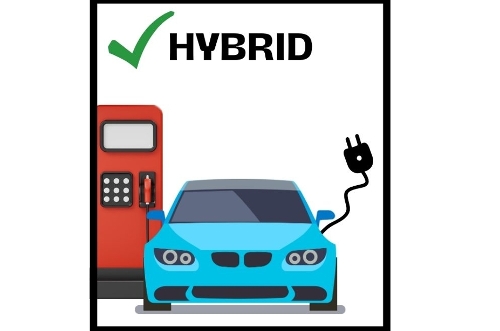
Gasoline Battery Hybrid Vehicles
Center for Energy & Environmental Policy
December 8, 2023
Gasoline hybrid vehicles are so popular that finding one at any car dealership has been challenging. For instance, I've received many offers from car dealerships that they want to buy my two-year-old hybrid car for almost just as much as what I originally purchased it for! At the same time, when I asked the salesperson about upgrading to a new hybrid car, they told me they didn't have one in stock and were unsure when they'd get one in.
Why are they so popular? Let's take a look...
Table 1.0 below shows the gasoline mileage of fifteen 2023 vehicles offering both a hybrid and a conventional gasoline version. The average hybrid gets 69% better mileage (saving about 18 miles per gallon). I never need to find a charging station because my hybrid car's "driving range" is over 600 miles on a tank of gas.
Table 1.0: 2023 Hybrid vs. Gasoline / Hybrid Car Summary / Combined Mileage

How expensive are they? Let's make a comparison...
In 2023, according to the US Energy Information Administration, the average price differences are:
- You'll pay $3,400 more for a mid-size hybrid than a standard gasoline vehicle;
- You'll pay $11,800 more for a gasoline plug-in electric hybrid than a standard gasoline vehicle;
- You'll pay $13,100 more for a full-battery electric vehicle (EV with 300 miles range) than a standard gasoline vehicle.
Additionally...
- According to a 2023 Global Data report, hybrid car sales (1.4 million) are outselling full battery electric vehicle sales (1.2 million). EV sales are slipping.
- Fortune magazine also reports EV dealer inventory was 88 days at the end of September 2023 compared to 56 days for conventional vehicles.
- Manufacturers seem to be moving forward on hybrid technology. Toyota just announced the 2024 Camry will only be offered in a hybrid version, and Ford has improved its hybrid F-150 pickup truck.
- According to an automotive news website called Jalopnik, a Toyota spokesman said, "The same materials used for one long-range EV could instead be used to produce 90 hybrid vehicles. The overall reduction in carbon of those hybrids is 37 times the reduction of that one single electric vehicle."
EV buyers may qualify for up to a $7,500 federal subsidy. In addition, some states often offer additional subsidies. For example, Delaware gives buyers $2,500 towards the purchase price of a full-battery EV and $1,000 for a plug-in hybrid.
NOTE: A Goldman Sachs report estimated federal subsidies might cost taxpayers $393 billion over the next ten years, plus another $196 billion for subsidies to battery factories.
BOTTOM LINE: These costs and subsidies don't yield much carbon dioxide emission reductions.
A "cradle to grave" comparison, taking into account emissions from mineral mining and assembly, shows gasoline hybrids save about twice as much emissions as a full-battery electric vehicle over 100,000 miles.
It's time to end subsidies and mandates for full-battery electric vehicles and let the market decide the best way to reduce emissions. However, if you have to choose, the best choice is gasoline hybrids.